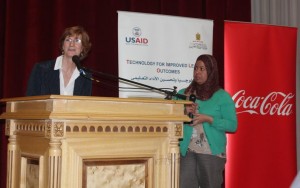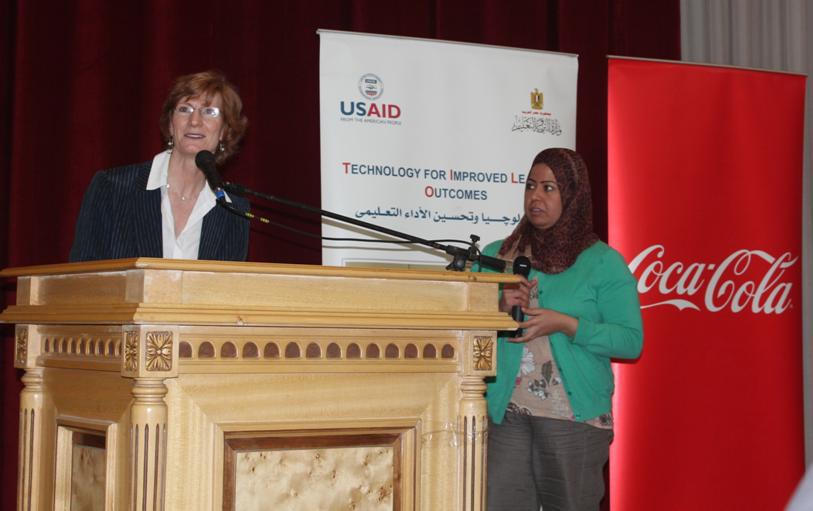
(Photo courtesy of USAID Facebook Page)
By: Lamia Nabil
US and Egyptian officials celebrated on Wednesday the graduation of 234 educators from the Greater Cairo region from The Technology for Improved Learning Outcomes (TILO) programme
The programme is funded by the US Agency for International Development (USAID) and a number of private sector companies.
“The TILO programme has helped to improve schools throughout Egypt, integrating new technologies that help increase student learning,” said Sohair Salem, head of the TILO project, during her welcoming note.
John Beed, deputy mission director for USAID, said that the contributions of educational establishments throughout the country “had been instrumental to the success of these schools and to the expansion of the programme to others in their provinces”.
The programme, he added, had “achieved extraordinary success”.
The TILO programme has equipped the schools with technology and digital resources, and delivered hands-on training to teachers, supervisors, and local administration. Throughout Egypt 400 schools participated in the project, and 18 schools Greater Cairo.
“To date over 255,000 students and 21,000 teachers from nine provinces have participated in the project,” according to Salem
“The total number of schools in focus provinces were 192 elementary schools, 58 experimental language schools, and 127 preparatory schools,” she added.
Lisa Franchett, director of educational activities for the TILO programme, said that this is the first time such educational technology programmes have been established in Egypt. “We care a lot about the quality of education to spread technology and new software to help children to improve their learning methods,” she said. “The programme has helped to improve students’ absorption of information through the improved software.”
The TILO project comprises four components focused on improving the quality of teaching and learning through introducing education technology through school reform activities; providing hardware which schools can manage; training teachers, supervisors, and inspectors in using technology tools in specific ways; and through introducing digital resources and active learning methods to increase knowledge, critical thinking and problem solving skills.
“I want to emphasise the teacher training component of the programme,” said Franchett. “The support to school administration that this critical component provided needed time in order to prepare the teachers in using such technology.”
Another component of the programme involves partnerships with educational establishments which aim to increase innovation and share responsibility through building on best practice through collaboration with the private sector, leveraging resources and expertise, and sustaining the management of education technology through shared responsibility among the Government, the private sector, schools, and communities.
“I’ve observed huge commitment from the governorates involved,” added Frenchett. “The programme has really helped improve the level of education in the schools. One of the important things happing in Egypt at the moment is the improvement in early grade reading because a few years ago we took a sample from early grade students, grades 4 and 5 they couldn’t read at all.”
“Over the last two and half years, however, there has been a significant improvement here. In fact, last week we had Government officials from Yemen who came here to observe how the Egyptian government did early graders’ reading. Egypt has become a significant example in this matter,” she added. “The situation in Egypt after the revolution is one of instability and political unrest, which has caused several problems in the implementation of the programme, but the cooperation of the Egyptian Government, especially the Ministry of Education, has had a significant impact on the success of this experiment.”
The TILO programme also seeks to improve the capacity for the effective management of education technology through working in tandem with the Ministry of Education and communities to develop effective ways to manage and sustain technology in schools.
Another aim of the project is to measure the impact of technology on teaching, learning, and management, through monitoring and evaluating project inputs, processes and impact.
Franchett also said that education needs to pay attention to job creation factors appropriate to the needs of the market and to combine private and professional schools.
“We need to encourage cooperation [between the public and private sectors] because there is currently mistrust between the Government and private sector,” she said. “But with our [USAID’s] contribution, both of them will become convinced that such partnerships can be productive”.
She added that the US Government had already begun, in cooperation with the Egyptian Government, the development of the technical education sector three years ago with an estimated budgeted $5m in order to develop and support schools with technological means.
Franchet pointed in particular to the STAMP programme, which will focus in the coming period on making available technological devices such as laptops for early graders or preschool infants, and will focus on technology programmes to support in mathematics and science education with estimated budget $2.5m. She stressed the US’s commitment towards Egypt regardless of “the problems with The World Bank or any other funding problems”.
“Regarding women, we are planning an initiative to help them participate in the economic sector and to encourage more effective participation in the government sector as well,” she revealed
“For universities we will hold a dialogue with Alexandria University next Monday to encourage the involvement of university professors in development programmes to help improve educational methods by using technology.”
Franchett also added that the importance of such programmes in creating a favorable environment for undergraduate students.
Launched in May 2007, the TILO programme was extended to last until August 2013 as requested from the undersecretaries, the educational administration and directors at the Ministry of Education.
The project is implemented in cooperation with the Ministry of Education and is financed under the USAID Partnership Strategic Objective Grant Agreement for Basic Education.



